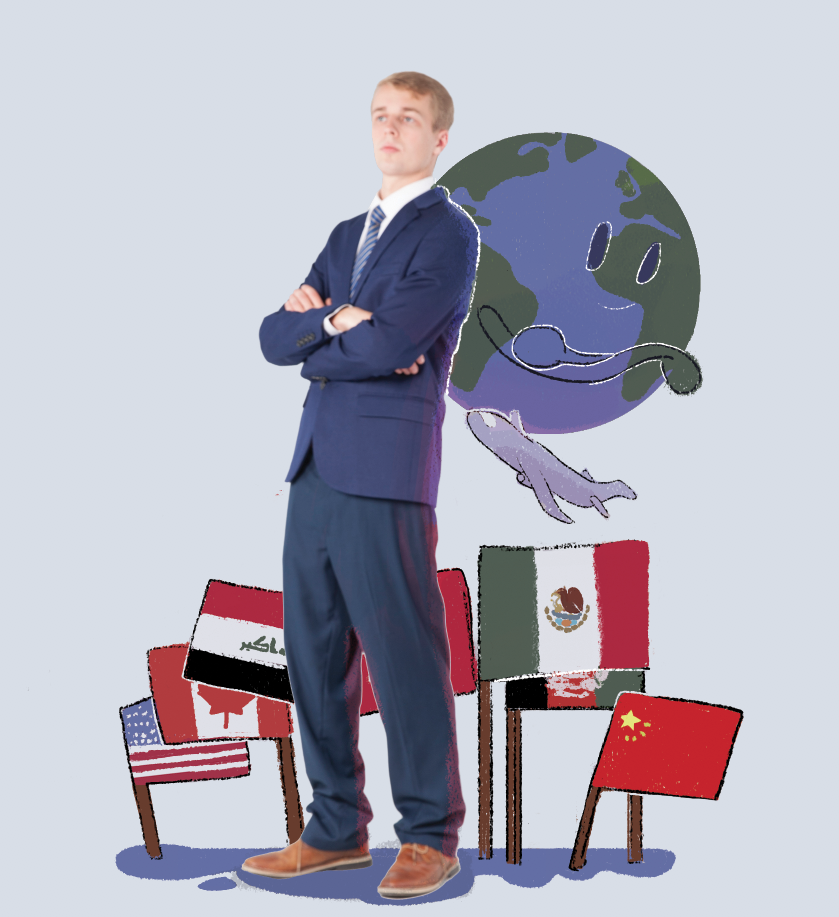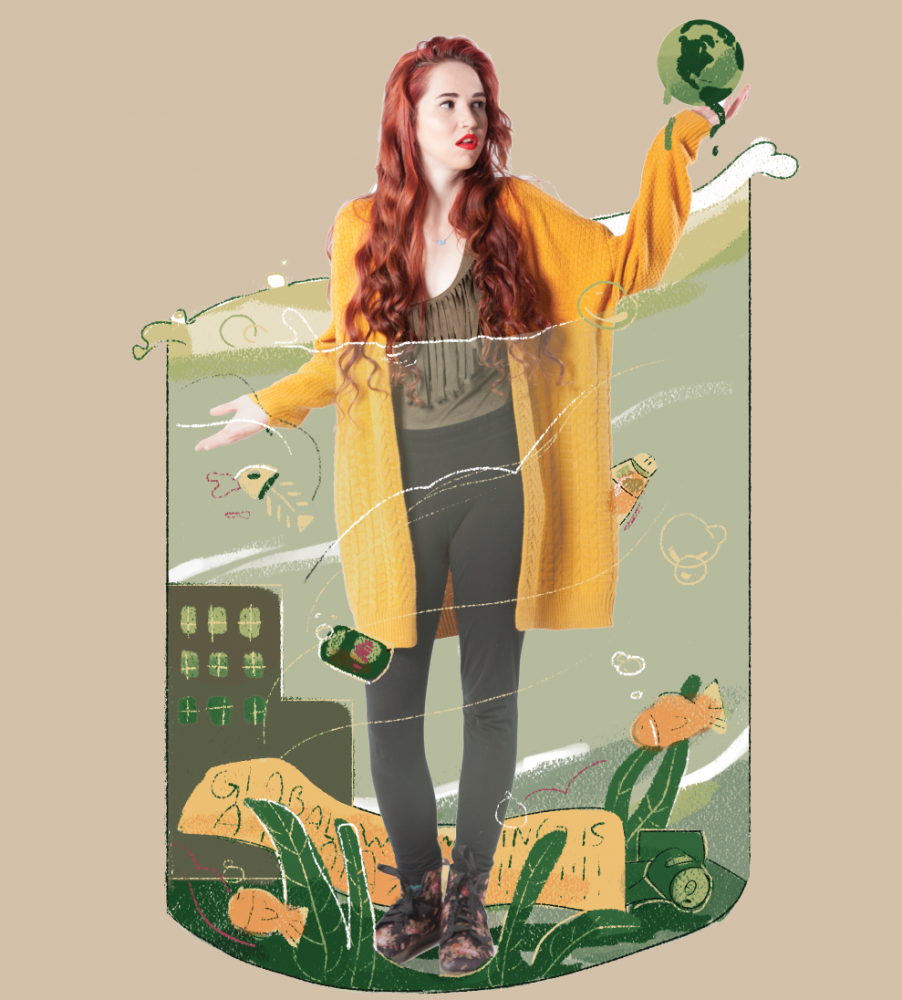As the semester comes to a close, it's very easy to lose track of anything beyond the RIT bubble. This time of year, our academic tunnel vision begins to tighten around feverish cramming sessions and frenzied keyboard pounding as we prepare for exams, presentations and papers looming on the horizon.
At times like these it can be helpful to take a step back and look at the big picture. We asked RIT students who have managed to keep their heads up while plowing through their homework to share their hopes for the future of politics, climate change and their own job prospects.
Political Divisions
Fourth year Biotech and Biomedical Science major Farid Barquet has made sure to stay involved throughout his RIT career. As Student Government president, Barquet believes strongly in civic engagement and therefore follows the current political culture in the U.S. very closely.
"The most recent U.S. presidential election saw levels of political polarization spike to concerning levels nationwide. It doesn't seem like rhetoric exchanged between the dominant political parties has softened much since the election," Barquet said.
Second year Computing Security major and College Republicans President Elliot Fisher also acknowledged this problem, and was concerned that it isn't easily mitigated.
“How do we solve the us versus them issue? The thing is, if you had a solution to this I bet you could make millions of dollars,” Fisher said. “Maybe it's just better educating people and introducing them to people who are on the right, and who are on the left, to try and say that the solution might lie between where our two parties tend to sit. How you go about doing that, I don't know.”
Barquet agreed that more dialogue and less vitriol could help the situation.
“If you're in college ... you should be taking a deep look at yourself and thinking, 'Why do I believe what I believe, and does the other side have something right to it,'" Barquet said. "If more people start doing that, then I think we can really turn this divisive time around."
Despite the often toxic nature of our current political climate, Barquet tries to remain optimistic.
"It's a scary time right now, but I believe that the current generation of college students that we have are so focused on change that we are going to accomplish it."
“I am personally hopeful for the future. It's a scary time right now, but I believe that the current generation of college students are so focused on change that we are going to accomplish it,” Barquet said.
Climate Change
Climate change is one of the aforementioned causes many college students have rallied behind. President of RIT's Student Environmental Action League (SEAL), fourth year Biology major Abby Frawley, is one of the students who is particularly passionate about the preservation of our planet.
“It's weird. I look at some data and I'm very hopeful about if we can reverse our course and protect our environment, but I guess that's balanced by the inaction of the federal government and even people in general," Frawley said. "People are worried, but they might not necessarily talk to their representatives."
Third year Computer Science major and College Democrats President Jason Wolf is concerned that even when people do talk with their representatives, sometimes it seems like they don't listen very well. He isn't pleased with how the democracy's highest elected official is representing the nation's environmental interests.
“I'm going to have to be honest in that I'm not very hopeful about climate change because of the actions the Trump administration has been taking, and within Trump's candidacy, on a range from denying climate change to not making any action to combat it on any level," Wolf said. “Climate change is happening ... it's not a good thing to add to the current set of tensions which are already rising."
Fisher isn't the biggest fan of the Trump administration's environmental policies either, but he's taking the long view.
“It really depends on how much Trump can get pushed through," Fisher said. "There are some things I don't agree with him on, like wanting to pull back on the Clean Water Act ... but even then it probably wouldn't survive the next administration anyways. It'd all be reinstated."
Fisher is also optimistic about the environmental efforts that are being made on a global scale.
"Other nations that have been far worse than us in terms of climate policies have been making large strides toward a cleaner future," Fisher said. "China has recently shut down thousands of factories ... that was unexpected for, I'd say, just about everyone.”
Like it or not, climate change is a highly politicized issue. Frawley tries to look beyond the politics to see solutions from a non-partisan perspective.
“I don't associate with political parties, so sometimes it's tough ... we have to try and reach over that partisan divide and say, 'Hey, this is a problem that affects all of us,'” Frawley said.
Issues like climate change are complex and go far beyond any individual person. However, many students are thinking about what they can do to contribute to the solution. Frawley believes a key part of being involved in staying informed, which is a major goal of SEAL.
“We actually just had a discussion on environmental justice," Frawley said. "I know a lot of people came away learning a lot about problems they didn't know about and also feeling like they had tools ... to find ways to mitigate it. I think it's really easy to take a bleak perspective of what's happening and you know, I think we all have those days. But I think if we all maintain our own hope then that can really help bolster the community.”
According to Frawley, celebrating every victory is essential to keeping up hope in the face of daunting obstacles.
“Something I'm really passionate about is species conservation. I'm a big animal lover, I'm a bio major. I heard that elephant poaching was down like 30 percent in the last couple years. I was really happy to hear that,” Frawley said.
Foreign Relations
Climate change is a global issue, and large scale efforts to address it often hinge on the relationships between major industrial nations. Foreign relations is another area of concern for Wolf, who sees President Trump's approach to the matter as dangerous.
“His recklessness is a legitimate threat to the stability of the country," Wolf said. "The fact that it doesn't really jostle me from day to day terrifies me even more because it's a normal thing at this point. We wake up and, oh there's another rising tension with a foreign power and that just comes out in a tweet. That's what I wake up to.”
Fisher suggests that though Trump is a loose cannon, the world won't unravel in response.
“Is Trump the best option for foreign policy? Not in everything, probably not in most things, but even then I think we will still be fine in the long term," Fisher said. "He's only here for eight years, then we'll have someone else. I think the majority of world leaders recognize that as well so they're not going to declare war or cut ties just because of the current administration.”
It's hard for anyone, let alone busy college students, to keep ahead of what's going on in the news. However, when everything starts to seem overwhelming, Wolf finds it helpful to remember that although one person can't save the world, communities of passionate people can.
"I've seen people locally in community organizations trying to make a difference on a small scale level, and that gives me hope."
“I've seen people locally in community organizations trying to make a difference on a small scale level, and that gives me hope ... I'm also involving myself in the things that I care about, so I'm at a good spot with that,” Wolf said.
Job Prospects
On a more personal level, students are optimistic that the effort they're putting in to at school will pay off with a good job.
“I'm a computer science student, and my field seems to be growing and has high demand,” Wolf observed.
“I'm a Security major so I feel that I'm fine no matter what ... Anyone in Golisano tends to feel that way as well,” agreed Fisher.
Students in the tech-centric Golisano college may feel especially safe in today's digitized world, but students in other majors appear to be just as hopeful that RIT has prepared them for their own job hunt.
“I'm definitely hopeful that I can get a job more easily because I'm an RIT grad. I think that definitely gives me a leg up and has a lot more potential for me to get jobs than if I went somewhere else,” said Sam Herman, a fourth year Graphic Design major.
Sam Straub, a third year Industrial Design major, is a little more apprehensive about his personal future. As a member of the next generation of military officers participating in the Navy ROTC program, Straub is looking ahead to receiving his commission after graduation.
“That is something that I'm gonna have a hard time with because I've never done that before," Straub said. "I've never led a group of people through life-threatening circumstances yet and when I do that it's really gonna be trial by fire. I have to succeed, it's not really an option. RIT doesn't have me too stressed out. I'm pretty used to the way RIT works.”
Olivia Williams is a third year Packaging Science major. She offered her comments while fundraising in the SAU for her club, Women Of Excellence Supporting STEM (WOESS).
“In the future I hope just to be successful honestly," Williams said. "I hope that my career goes forward and that I'm able to make the right decisions and just have a healthy home.”
Whether they want to avoid World War III, reverse climate change, or just survive college and get a job — the most hopeful students are the ones getting together with other people who care in order to do something about it.
What do you hope for?
"Since there's been such a large number of suicides within this local community ... I'm hopeful that people do come out and talk about it more, because that'll help end the stigma of suicide.” - Matthew Collins, second year Finance and Management.
“I just hope like hell that I can find a job at my age going into a job market where everybody there is in their 20s." - Stacy Sheppard, fourth year Graphic Design, 49 year-old former drill sergeant
“I just hope that people stay mindful about what they say to each other ... You never know what people are going through so I want people to be more optimistic. I hope for optimism.” - Olivia Williams, third year Packaging Science , WOESS member.
“Right now I'm applying to grad schools. It's stressful but I'm hopeful." - Farid Barquet, fourth year Biotech and Biomedical Sciences double major, SG president
"I think if we all maintain our own hope then that can really help bolster the community." - Abby Frawley, fourth year Biology major and president of SEAL.










